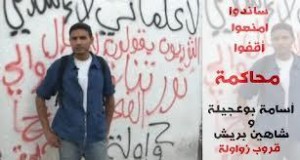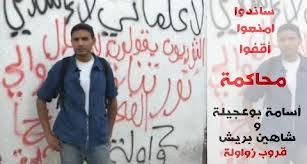
Oussame Boujeile (pictured) and Chaine Bilrish face prison for their political graffiti.
While welcoming moves to implement measures that guarantee media independence, the IFEX Tunisia Monitoring Group (IFEX-TMG), a coalition of 21 IFEX members, calls on the Tunisian government to fully respect freedom of expression in the new Constitution and to put an end to attacks on journalists and artists.
On 23 November, national TV journalist and presenter Said Al-Khazami – well-known for criticising the government’s attempts to control content on the national TV – was fired by the channel’s director. The arbitrary firing raised concerns about continued political meddling in the public media.
This news came on the back of some cautious optimism for the media sector. At a meeting in October with media professionals, Tunisian officials announced they would finally implement decrees 115 and 116 on media freedom, which will lead to the establishment on 10 December 2012 of the Independent High Authority for Audiovisual Communications (HAICA). IFEX-TMG further calls on the Tunisian authorities to guarantee independence by involving the National Syndicate for Tunisian Journalists (SNJT) and other media bodies in the consultations leading up to the HAICA’s establishment.
The meeting was arranged after a general media strike was called on 17 October 2012 to demand media independence, including transparency in media appointments. Following the strike, former police commissioner Lotfi Touati, whose appointment had been heavily criticised, was removed from his job as general director of Dar Assabah newspaper. The IFEX-TMG called the removal of Touati “a positive step,” but notes with concern that he was then immediately appointed on 31 October to another high profile government post at the National Centre for Documentation. The move was seen by local media as an indication that the government is not interested in listening to their concerns.
Furthermore, IFEX-TMG remains concerned that the draft constitution in its current state violates the right to freedom of expression. Provisions that protect “sacred values” leave interpretation to the whim of those who uphold them and could be used to criminalise speech, therefore should be removed from the draft. In addition, references to media freedoms and media regulation do not meet international standards and fail to guarantee media independence, and should be redrafted.
Criminal Defamation Remains on the Books
Criminal defamation laws already threaten free expression in Tunisia, says IFEX-TMG. In Mahdiya on 6 November, journalist Gazi Mabrouk was charged under Article 86 of the Communication Law with “criminal defamation” and “spreading false news on the Internet.” According to the Tunis Centre for Press Freedom, Mabrouk could be sentenced to up to two years in prison. The charges stem from an article published on 26 August 2011 on the site Tunez Tantakhib (Tunisia Votes) about workers suffering at the Boumerdès clothing factory.
In another worrying incident, in September, the Minister of Higher Education filed a criminal defamation suit against Adel Al-Hajji, a journalist with Al-Tariq Al-Jadid newspaper, for publishing an article in which Al-Hajji described how the Minister ordered Ministry employees to put a religious sign on their desks with the direction of Mecca. Al-Hajji was accused of “spreading false news” and “disturbing the public order.” However, IFEX-TMG welcomes the decision of the presiding judge, on 2 November, to dismiss the case.
Attacks on Freedom of Expression Continue
In the meantime, attacks on freedom of expression continue unabated in Tunisia. On 3 November, Oussame Boujeile and Chaine Bilrish, two members of the Zwewla graffiti movement, were arrested by police in Gabès City for writing graffiti on the walls. The police used live ammunition to stop them from running away. Released after interrogation, both were later charged on 6 November with “breaking the emergency laws, spreading false news that may affect public order, and writing on public property without permission.” The accused are scheduled to appear in court on 5 December 2012 and face possible lengthy prison sentences.
Finally, IFEX-TMG notes that there is little justice for those who are violently attacked for exercising their right to free expression. IFEX-TMG members marked theInternational Day to End Impunity in November by highlighting the case of poet Sghaier Ouled Ahmed, who was hospitalised after being violently attacked by five Salafists in August, following an interview Ahmed gave that was critical of the ruling party, Ennahda. Nobody has been brought to justice for this attack, which is just one of many in the name of political or religious beliefs.
Arabic Network for Human Rights Information
ARTICLE 19
Bahrain Center for Human Rights
Cairo Institute for Human Rights Studies
Canadian Journalists for Free Expression
Cartoonists Rights Network International
Egyptian Organization for Human Rights
Freedom House
Index on Censorship
International Federation of Journalists
International Federation of Library Associations and Institutions
International Press Institute
International Publishers Association
Journaliste en danger
Maharat Foundation
Media Institute of Southern Africa
Norwegian PEN
World Association of Community Radio Broadcasters – AMARC
World Association of Newspapers and News Publishers
World Press Freedom Committee
Writers in Prison Committee, PEN International
Share this Post

